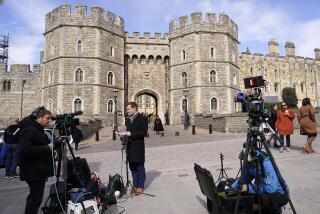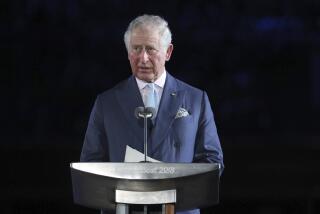Queen Now Will Pay Taxes, Boost Support for Family
- Share via
LONDON — Queen Elizabeth II, one of the world’s richest individuals, finally has succumbed to one of life’s inevitabilities: Her Majesty now will pay taxes, British Prime Minister John Major told Parliament on Thursday.
In his surprise announcement, Major also said the queen will bear more of the cost of maintaining the Royal Family. He said the queen, 66, had proposed to him earlier this year that the “civil list”--the roster of Royal Family members on the public payroll--be slashed so it included just herself, her husband, Prince Philip, and her mother, Queen Mother Elizabeth.
The queen would pay to support three of her four children, Princess Anne, Prince Andrew and Prince Edward; her sister, Princess Margaret, and her 90-year-old aunt, Princess Alice.
Her Majesty told the prime minister, he said, that Prince Charles also proposed to pay taxes at the same rate as the queen.
The royal moves to pay taxes and to reduce the civil list--announced as the queen nears the end of what she herself has described as a “horrible year”--may help defuse the burgeoning controversy here over public support for the Royal Family.
After Major’s announcement, Lord St. John of Fawlsey, a former Conservative Party Cabinet minister and a stout defender of the Royal Family, said the moves show that the queen is “closely in touch with the interests and feelings of her people.”
And Ann Clyd, a Labor Party heritage spokeswoman who had been pushing for the queen to contribute to the cost of rebuilding fire-ravaged Windsor Castle, said Thursday’s statement proved that public opinion can move the monarchy.
The queen and her kin have long been exempt from paying taxes into Britain’s treasury, and much of their sumptuous life style is underwritten by British taxpayers--who have been suffering through one of the nation’s longest recessions since World War II and have been battered by unceasing, daily tabloid coverage of the various royal matters.
Major’s government found itself engulfed in even more acrimony over the issue when it announced that it would cover the cost of repairing the damage caused by the disastrous fire last weekend at Windsor Castle, the Royal Family’s weekend retreat just west of London.
That bill is expected to run to about $100 million over the next several years, and many members of Parliament, as well as the already rancorous tabloid press, suggested that the queen should cover at least part of the Windsor fire expenses from her private income.
The queen’s private income has never been disclosed--and, by tradition, it need not be.
But it is the object of intense speculation among financial experts, who have estimated that it ranges from a low of $100 million to a high of $15 billion. Further complicating a clear picture of the queen’s net worth is defining what she owns in her own right--as opposed to what she owns as Britain’s monarch; it is also difficult to calculate what is her private income from investments, as opposed to the sums she receives from her royal annual allowance.
Philip Beresford, who produces an annual review of the wealthiest people in Britain, recently estimated the queen’s total wealth at $9.9 billion; he fixed her disposable personal assets at just $1.5 billion.
But in the aftermath of the Windsor fire, Prince Edward, the queen’s youngest son, when asked about the size of his mother’s income and whether she would contribute to the castle’s reconstruction, replied angrily: “I’ve heard these rumors that my mother has 6.5 billion pounds (some $9.9 billion). Absolute crap!”
The prince’s testy reply was just one in a series of increasingly blunt public comments by Royal Family members--a trend toward frankness that the queen herself partook of in a luncheon speech last week marking the 40th anniversary of her accession to the throne. While conceding that her regal kin should not be immune to criticism, she adopted a rare personal tone and urged the media to be less strident in their coverage of her troubled family.
In the past year, the royal children have been rocked by scandals, including:
* The marriage of Prince Charles and his wife, Princess Diana, has foundered.
* Prince Andrew, and his wife, the Duchess of York, have become estranged and now live apart. The popular duchess, known as Fergie, also became grist for sustained, often sensational tabloid coverage, which included the publication of photographs of her, partially clothed.
* Princess Anne divorced and was rumored to be ready to marry a naval officer.
The tumult in the royal household received such extensive publicity that many analysts said it simply made sense that opinion polls showed a precipitous decline in its overall popularity among ordinary Britons.
While Major on Thursday did not disclose details of the royals’ new tax arrangements, Britain’s maximum tax rate is 40% and it is doubtful that the Royal Family would pay more. Major said their new taxes would be in place by next April, when Britain’s new tax year begins.
The prime minister noted that Prince Charles already pays 25% tax on income from the Duchy of Cornwall estates. The Duchy of Cornwall owns rural property throughout Britain, as well as expensive real estate in London. The queen, of course, has vast real estate holdings across Britain, and reportedly abroad.
The concept of royal income tax has undergone various shifts over the years. In Victoria’s reign in the last century, the queen paid various taxes voluntarily. But in the era of her great-grandson--George VI, Queen Elizabeth II’s father--the government agreed that the Royal Family did not have to pay income and other taxes.
While many of the regal holdings, like Windsor Castle, are considered to be state property, others--including castles like Sandringham in Norfolk and Balmoral in Scotland--are thought to be the queen’s private holdings.
In a similar fashion, the queen’s vast and enormously valuable art collection, theoretically, is hers to dispose of as she wishes; still, the collection, one of the world’s largest, in another sense is a critical part of Britain’s cultural heritage. The situation with the royal jewels is similar.
These assets do not produce income. But the queen is said to have a vast portfolio of stocks and bonds, managed secretly by London financial experts. At the same time, however, many of the Royal Family’s expenses are picked up by government departments, which run a special train, air flights and the regal yacht, Britannia.
More to Read
Sign up for Essential California
The most important California stories and recommendations in your inbox every morning.
You may occasionally receive promotional content from the Los Angeles Times.












